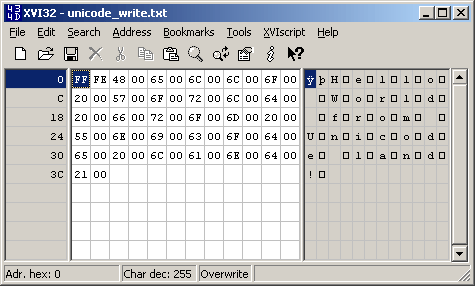Introduction
As Unicode becomes more popular, programmers will find themselves performing more file-based operations using Unicode. Currently, familiar MFC classes such as CFile and CStdioFile do not properly handle reading and writing a Unicode file. The class file presented addresses the need to read and write files as UTF-16 Unicode files.
Downloads
There are two downloads associated with this article. RevisedCUtf16File.zip is the February 2005 release of the code. RevisedCUtf16File.zip is Jordan Walter’s revision to the original code. Jordan’s enhancements include bug fixes and improved support for Unicode projects. Both downloads provide a test harness.
Using the Code
During construction or with the use of the Open() member function, the class will examine the first two bytes of the file after appropriate size checking. The two-byte sequence (BOM) 0xFE, 0xFF indicates the file is UTF-16 encoded. If this is the case, m_bIsUnicode is set to TRUE. If the bytes are not present, the class performs a CStdioFile::Seek(0, CFile::begin ) to return the consumed bytes.
CStdioFile::Read( &wcBOM, sizeof( WCHAR ) );if( wcBOM == UNICODE_BOM ) {
m_bIsUnicode = TRUE;
m_bByteSwapped = FALSE;
}if( wcBOM == UNICODE_RBOM ) {
m_bIsUnicode = TRUE;
m_bByteSwapped = TRUE;
}// Not a BOM mark – treat it as an ANSI file
// and defer to CStdioFile…
if( FALSE == m_bIsUnicode ) {CStdioFile::Seek( 0, CFile::begin );
}
ReadString(...) occurs as follows: If m_bIsUnicode is FALSE, the class returns the appropriate CStdioFile::ReadString(...) operation. If the file is UTF-16 encoded, the class will draw from an internal accumulator until a "\r" or "\n" is encountered when using CUTF16File::ReadString(CString& rString ). If using the CUTF16File::ReadString( LPWSTR lpsz, UINT nMax ) overload, CStdioFile::ReadString() behavior is duplicated. See the underlying comment from fgets().
The above read is accomplished through an accumulator. The accumulator is a STL list of WCHARs. When filling the accumulator, byte swapping occurs if a Big Endian stream (0xFF, 0xFE) is encountered.
Writing to a file is accomplished by extending the normal function with WriteString(LPCTSTR lpsz, BOOL bAsUnicode ). CStdioFile will handle the ANSI conversion internally, so CUTF16File simply yields to CStdioFile. If bAsUnicode is TRUE, the program will write the BOM (if file position is 0), and then call CFile::Write(...).
The program will open two files on the hard drive, write out both Unicode and ANSI text files, and then read the files back in. The driver program then uses OutputDebugString(...) to write messages to the debugger’s output window.
CUTF16File output1( L”unicode_write.txt”, CFile::modeWrite |
CFile::modeCreate );
output1.WriteString( L”Hello World from Unicode land!”, TRUE );
output1.Close();…
CString szInput;
CUTF16File input1( L”unicode_write.txt”, CFile::modeRead );
input1.ReadString( szInput );
Figure 1 is the result of writing a test file with the provided driver program. Notice that the BOM bytes are swapped on the disk.

Figure 1: Result of test program.
Figure 2 examines a similar file created with Notepad on Windows 2000 while saving the file as Unicode.

Figure 2: A Unicode sample created in Notepad.
Additional Reading
- http://www.unicode.org/.
- International Programming for Microsoft Windows by D. Schmitt, ISBN 1-57231-956-9.
- Programming Windows with MFC by J. Prosise, ISBN 1-57231-695-0.
- Programming Server-Side Applications for Microsoft Windows 2000 by J. Richter and J. Clark, ISBN 0-73560-753-2.
Revisions
- 12.23.2006 Added Jordan Walter’s Improvements and Bug Fixes
- 02.10.2005 Original Release
Checksums
OriginalCUtf16File.zip
MD5: 696F5C035367A70E5F53B1EC7572FDD2
SHA-1: 180354760E120319F813EC618DDB0BC8BA96DEF2
RIPEMD-160: AA9157FC548795237E15EC29B94E426892689A61
SHA-256: 03D6E6C9E0D3C4EB3C0FB328F15C72006417393C31CAE1508EAFAB1165228E01
RevisedCUtf16File.zip
MD5: 8F87A671C7EEB935A9833B32860189D9
SHA-1: C3D7868C67EE9BF0EF888C8AC64433658DBC0172
RIPEMD-160: 283F9D07F3AA904D42E5EE67D31822C1B95B61A1
SHA-256: 3B13D5503420C4C9851C62A8951ED3388E2976F16E1342F0CFBF5FD8C4EAE9D8


